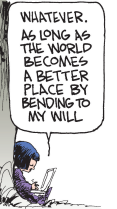We all know the phrase, “lost in thought.” Expressed this way “thought” sounds like a place we visit, and a place we might leave whenever we choose. But how do we do that? What bus or train can take us away from our thoughts?
One answer might seem counterintuitive: pay attention to your thoughts. According to Yongey Mingyur Rinpoche (“The Aim of Attention,” Tricycle, Summer 2009), when you pay attention, that is, you become aware of your thoughts as thoughts, space naturally opens up around them and you are no longer “lost” inside them.
Awareness comes naturally to you. It is always available. By practicing attention meditation, sitting still and doing nothing more than just paying attention to the rising and falling of thoughts, emotions, body sensations, you learn to access awareness more easily and bring stability to your awareness. As you do this, the space around your thoughts will increase and stabilize as well.


